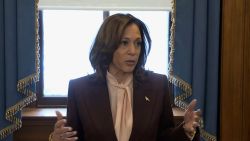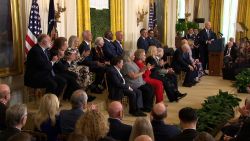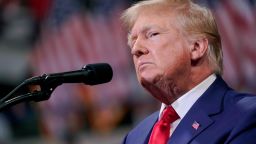Former President Donald Trump asked the Supreme Court on Tuesday to intervene in the dispute over materials marked as classified that the FBI seized from his Mar-a-Lago estate this summer.
His emergency request with the Supreme Court is the latest example of the former President seeking to involve the justices in investigations that entangle him – at a time when the high court’s legitimacy in politically explosive cases is under intense scrutiny.
Trump is specifically asking the court to ensure that the more than 100 documents marked as classified are part of the special master’s review. The request, if granted, could bolster the former President’s attempt to challenge the search in court, as he has argued that he may have had a right, as a former president, to possess certain government documents, including documents potentially containing the country’s most sensitive secrets.
Trump, though, is not asking the Supreme Court to block the Justice Department from using the documents in its criminal probe into how materials from his White House were mishandled.
Justice Clarence Thomas – the recipient of Trump’s application because he oversees litigation coming from the circuit court that is handling the special master order appeal – gave the Justice Department a deadline of 5 p.m. Tuesday, October 11, to respond.
It remains to be seen whether allowing the special master – a third-party attorney tasked with reviewing evidence and filtering out privileged documents – to also access classified documents poses a real threat to the criminal investigation. Nor is it clear how sympathetic the high court will be to Trump’s claims, which rest largely on technical arguments about whether an appeals court had the authority to carve out the 100 documents from the review.
Late last year, Trump asked the justices to block the release of documents from his White House to congressional January 6, 2021, investigators. The high court rejected the request.
Trump’s emergency application to the Supreme Court comes after the 11th US Circuit Court of Appeals sided with the Justice Department and said that the department’s criminal investigation into the documents marked as classified could continue. The probe’s use of the records had been put on hold by a district judge in Florida, who granted a Trump request for a third-party review of the materials obtained in the Mar-a-Lago search. That appeals court is now considering whether to wipe away the rest of the special master order.
A narrow legal request before SCOTUS
Trump is not asking the high court to restore the hold that Judge Aileen Cannon – a US district judge he nominated in 2020 – put on the Justice Department probe accessing the documents marked classified. But Trump wants those documents put back within the scope of the materials special master is reviewing.
In the new filing, Trump’s attorneys said that “any limit on the comprehensive and transparent review of materials seized in the extraordinary raid of a President’s home erodes public confidence in our system of justice.”
They also pushed back on the Justice Department’s claims that including the documents in the special master review would pose national security risks.
“The Government argued on appeal, without explanation, that showing the purportedly classified documents to Judge Dearie would harm national security,” Trump’s attorneys said, referring to senior Judge Raymond Dearie, who has been appointed special master in the dispute. The Trump team said that position “cannot be reconciled” with the DOJ saying it may want to show those same documents to a grand jury or to witnesses during interviews.
In filings before the lower court, the Justice Department had also cautioned that having Dearie’s review cover those documents would potentially allow members of Trump’s legal team to access them, including lawyers whom the department has signaled it views as possible witnesses in its investigation.
Cannon, the Justice Department previously told the 11th Circuit, had “ordered disclosure of highly sensitive material to a special master and to Plaintiff’s counsel—potentially including witnesses to relevant events—in the midst of an investigation, where no charges have been brought.”
The purpose of getting a special master to review those documents is not entirely fleshed out by Trump’s new filing with the Supreme Court. Trump nodded to Cannon’s assertion that he, as former president, would suffer “reputational harm of a decidedly different order of magnitude” if he was indicted based on evidence that had been unlawfully seized. That rationale was squarely rejected by the 11th Circuit, when it carved out the documents from the special master review.
Elsewhere in the new application, Trump indicated his desire to include the documents marked as classified in the churn of challenges his lawyers will get to hash out before Dearie as part of the special master process. He re-upped arguments – viewed with extreme skepticism by a broad range of legal experts – that the Presidential Records Act may shield him from criminal charges brought for how he handled the materials. Trump also hinted at the idea that he may have declassified the records in question. As he has in earlier stages of the litigation, however, Trump stopped short of making the assertion outright.
On Tuesday, Trump told the Supreme Court that Cannon had the authority to refer “these matters to a special master to determine whether documents bearing classification markings are in fact classified, and regardless of classification, whether those records are personal records or Presidential records, such that their disposition may be managed properly under the PRA.”
“The Government’s position presumes certain documents are in fact classified, affording President Trump no opportunity to contend otherwise. This presumption is at the core of the dispute,” he said.
Bid pulls Supreme Court into another ‘messy’ Trump dispute
Trump’s application is landing at the Supreme Court’s door step as it embarks on a new term where the justices will consider several high-profile cases.
The Supreme Court, with its current conservative majority, is already viewed by the American public as partisan following a string of controversial rulings this year, including overturning Roe v. Wade, and will likely make the Mar-a-Lago search even more of an issue in the upcoming congressional midterm elections.
Trump appointed three of the current justices: Neil Gorsuch, Brett Kavanaugh and Amy Coney Barrett.
In addition, the justice who receives Supreme Court emergency requests out of Florida is conservative Thomas, although he is almost guaranteed to refer the petition to the full court to consider.
Thomas’ wife, conservative activist Ginni Thomas, promoted efforts to overturn the 2020 presidential election and has testified before the House select committee investigating the January 6, 2021, US Capitol attack.
CNN senior legal analyst Elie Honig said the appeal is intended to delay the Justice Department’s investigation into the former President, if possible.
“This is part of the delay strategy,” Honig said on CNN’s “The Lead with Jake Tapper,” noting Trump lost at the appeals court. “So either he accepts that loss and those documents don’t go to the special master and they go right over to DOJ, or his only remaining recourse is to try to get the Supreme Court to take it, and that’s the course he’s taking now.”
Honig said it’s a “close call” if the court will take up the case.
“The Supreme Court typically likes to stay out of messy, political disputes,” Honig said. “On the other hand, when it comes to sort of unique, novel issues of constitutional law, of separation of power, of issues like executive privilege and classification of documents, that’s sort of why the Supreme Court exists – to adjudicate those high level disputes between branches that involve sort of core constitutional principles.”
This story has been updated with additional details Tuesday.
CNN’s Paul LeBlanc, Katelyn Polantz, Ariane de Vogue and Jessica Schneider contributed to this report.

























